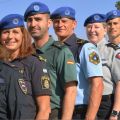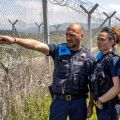Participation in international police missions
NRW has contributed a fifth of the police contingents of the state police forces for international police missions for decades and has performed leadership functions since the first mission in Bosnia/Mostar. The officers serve under the mandates of the United Nations (UN), the European Union (EU) and the Organization for Security and Co-operation in Europe (OSCE).
The prerequisites for the deployment of police officers from the federal states are a decision by the mandate provider (UN, EU, OSCE), a cabinet decision by the Federal Government and the approval of the participation of the federal states by the Conference of Interior Ministers. The focus of mission participation has increasingly shifted to Africa in recent years, whereas in the early years of international police missions, the focus was still on the Balkans.
For the NRW police, there are usually around 30 to 35 police officers on up to ten international police missions or Frontex missions at any one time. The federal states take part in Frontex-coordinated missions on a voluntary basis with a total of 30 police officers per eight-week deployment period. NRW reports twelve police officers to the Federal Police for each deployment period.
North Rhine-Westphalian police officers also serve with the following institutions for assignments abroad:
- Office of International Police Missions in Berlin and Potsdam,
- Foreign Office in Berlin,
- European External Action Service in Brussels,
- United Nations in New York and
- Frontex headquarters in Warsaw
NRW doubles Frontex deployment
The European Border and Coast Guard Agency, based in Warsaw, was founded in 2004 and is also known as Frontex (French: "frontières extérieures" 'external borders'). Frontex was originally based on Council Regulation (EC) No. 2007/2004 of October 26, 2004 establishing a European Agency for the Management of Operational Cooperation at the External Borders of the Member States of the European Union (EU). As an EU agency, Frontex is financed from the EU budget and by contributions from the associated Schengen countries.
In 2016, the agency was expanded and strengthened, extending its remit from controlling migration flows to border management and giving it increasing responsibility for combating cross-border crime. The individual EU member states work together to protect the Schengen external border and support each other technically and operationally. The Border Management Agency coordinates this cooperation.
Due to the extremely high pressure on the Schengen area as a result of the increased migration volume in 2015/2016, the federal government asked the federal states for support by deploying operational forces. Since then, NRW has been involved in Frontex-coordinated operations in Greece, Italy, Spain and Bulgaria. Federal and state police forces support other member states in controlling their external borders. In this case, they act as support for the police or border guards of the respective state in which they are deployed - not as federal police officers or as "Frontex officials" as is often heard.
Due to the need for effective external border protection, the legal basis for Frontex, which was adopted in 2004 and adapted several times in the following years, was amended again. Regulation (EU) 2019/1896 of the European Parliament and of the Council on the European Border and Coast Guard and repealing Regulations (EU) No 1052/2013 and (EU) 2016/1624 entered into force on November 13, 2019. With the new regulation, Frontex will have 5,000 border guards at its disposal from 2021 and the contribution of the member states will be mandatory in future. The number of staff is to increase continuously to 10,000 border guards by 2027, provided that a "mid-term evaluation" identifies a corresponding need.
Germany is obliged to provide 61 long-term and up to 540 short-term experts for Frontex from January 1, 2021. Depending on the outcome of the mid-term review, participation could increase to 225 long-term and up to 827 short-term experts by 2027. In addition to this, there are already 225 reserve forces for rapid deployment. The NRW police have been providing support since 2015 with short-term experts (usually for eight weeks) and from 2021 also as part of long-term deployments (usually 24 months).
In a further innovation, the Frontex agency now also has the option of concluding status agreements between the EU and third countries. This allows Frontex to deploy border management teams and liaison officers to the third countries concerned. Frontex has so far adopted a status agreement with Albania and Montenegro. Since August 2020, police officers from NRW have also been working for Frontex in Albania.
The Federal/State Working Group on International Police Missions (AG IPM)
The WG IPM was established in 1994 by the Conference of Interior Ministers (IMK) under the name of the Federal/Länder Working Group "International Police Task Force" (AG IPTF) as a predecessor to the WG IPM. The name was changed in 2005. The state of North Rhine-Westphalia was already trusted in 1994 and the then North Rhine-Westphalian inspector, Ulrich Dugas, was elected chairman of the IPTF working group. Since 2002, the former North Rhine-Westphalian Inspector of Police, Dieter Wehe, has headed the federal-state working group.
What was initially intended as a temporary project became a permanent institution with advisory and decision-making powers in all matters relating to the preparation, participation and implementation of foreign missions. The IPM working group operates from an office set up in the Federal Ministry of the Interior (BMI) with staff support from the federal states. The current "Guidelines for the Joint Participation of the Federal Government and the Federal States in International Police Missions" standardize, among other things, the criteria for selecting personnel or clarify, for example, salary and equipment issues.
On November 2, 2020, Dieter Wehe handed over the baton of AG Chairman to the Inspector of the NRW Police Michael Schemke. The event, originally planned as a ceremony at the autumn meeting of the IPM working group, took place in a small circle with Interior Minister Herbert Reul due to the coronavirus pandemic. The head of the department responsible for "International Police Missions" at the Federal Ministry of the Interior, Dagmar Busch, paid tribute to Dieter Wehe's achievements at this small ceremony and emphasized the importance of international police missions. The members of the IPM working group followed the event in a video conference call.


